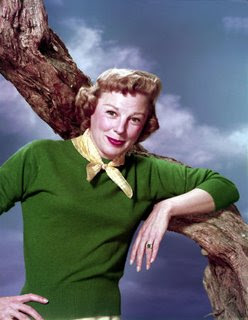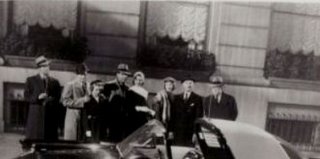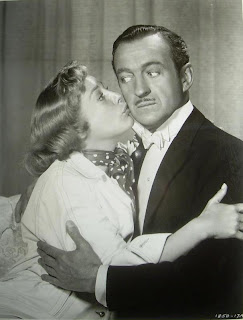 When the eternally youthful June Allyson died at age 89 on July 8, 2006, most of the coverage was devoted to her work at MGM and the various “wife” roles that she played in a string of biopics.
When the eternally youthful June Allyson died at age 89 on July 8, 2006, most of the coverage was devoted to her work at MGM and the various “wife” roles that she played in a string of biopics.Missing from all career appreciations was any mention of Jean Negulesco's shrewdly pre-feminist, all-star "Women's World" (1954), a Fox film, and three from Universal - José Ferrer's compelling “The Shrike” (1955), which dramatically cast Allyson against type; Henry Koster's remake of "My Man Godfrey" (1957), which teamed her with David Niven, and Douglas Sirk's version of "Interlude" (1957) with Rossano Brazzi.
Nowadays, all four are lost, impossible to see, although "Interlude" has been scheduled twice - and canceled twice - by Turner Classics. It was once penciled in for a Monday, September 29th/4:15 p.m. (est) screening, but has been replaced at that time by Anthony Asquith's "The Millionairess" (1961), starring Sophia Loren and Peter Sellers.

Jean Negulesco's
"Women's World" is a hugely entertaining, rather scathing little number that works as a variation on the "three-gal" flicks that the filmmaker perfected at 20th Century-Fox during the 1950s. Negulesco was responsbile for "How to Marry a Millionaire," "The Best of Everything," "Three Coins in a Fountain" - the grand-daddy of them all - and its '60s remake, "The Pleasure Seekers."

"Women's World" is sly subversion of the formula but every bit as affable and slick as its siblings. The plot - which could easily lend itself to a topical remake - follows the efforts of Clifton Webb, the powerful CEO of Gifford Motors, an auto manufacturer, to find a suitable replacement when he retires. To accomplish this, he wings in his company's three top branch managers - different men from different parts of the country - and their wives for a week of wining and dining and interviewing in New York. You need not ask why the film isn't set in Detroit. New York is clearly more glamorous.

The candidates include ambitious Van Heflin and his grasping wife Arlene Dahl, from Dallas; the contentious Fred MacMurray and Lauren Bacall, a Philadelphia couple on the verge of divorce, and Cornel Wilde as a down-to-earth guy from Kansas City and Allyson as his ditzy wife.
What no one catches on to is the fact that the boss is scrutinizing the wives as much as the men themselves, perhaps even more so.
Webb is at his sauve, sarcastic best - he was the original Kevin Spacey - as he taunts and tests his co-stars and generally has them squirming. The excellent, deliciously sexist ending comes with a twist that was daring for its time but that was totally in keeping with Webb and the advanced mindset he brought to his films.
BTW, the script was written by playwright Russell Crouse (father of Lindsay Crouse) and Claude Binyon, who also wrote Allyson's "You Can't Run Away from It" (1956), the Dick Powell-directed "It Happened One Night" musical remake for Columbia, which has been popping up recently on Turner Classics following many years of absence.

The disappearance of “The Shrike” is particularly odd, given its credentials. Based on the Pulitzer Prize-winning 1952 play by Joseph Kramm, the stage production won two Tony awards for José Ferrer – as best actor in a play and best director of a play. On stage, Ferrer co-starred with Judith Evelyn, best known as Miss Lonelyheart in Alfred Hitchcock’s “Rear Window.”
However, when Ferrer decided to transfer the play to film, his first as a director and with himself again in the male lead, he did the unforeseeable and hired Allyson to play the role of an unrelenting wife who pecks and pecks at her husband – much like the bird of the title – until she has effectively beaten him down.
With this film, Ferrer explored what critic Richard Schickel called Allyson’s “vaunted sweetness,” as well as the perilous state of marriage when one of its partners fairly drips and seduces with venom. “It was a delicious combination,” continues Schickel in his book “The Stars” (1962) – "her surface sweetness and the inner viciousness of the role.”

"My Man Godfrey," of course, is Henry Koster's remake of the Gregory La Cava 1936 classic farce about class differences that starred Carole Lombard (at her most irresistible) and the pitch-perfect William Powell (also irresistible).


Koster's version is amazingly faithful to the original, sometimes slavishly so, and yet it seems rather pale in comparison. Allyson, a true ordinary girl-next-door, is as miscast here as she was in "You Can't Run Away from It." This apple-pure actress was not meant to play screwball heiresses.
David Niven, on the other hand, fills Powell's shoes quite well and, as he proved so often in studio films around this time, he was the most urbane of good sports, embracing the best of both the reserved British and looser American cultures.
 James M. Cain concocted the story for Douglas Sirk's "Interlude," which was remade a decade later in 1968 under the same title by director Kevin Billington - although, for some bizaar reason, Cain goes uncredited in the Billington version. Oddly, Cain only supplied the story to Sirk. He didn't pen the screenplay. That was done by a collection of other writers.
James M. Cain concocted the story for Douglas Sirk's "Interlude," which was remade a decade later in 1968 under the same title by director Kevin Billington - although, for some bizaar reason, Cain goes uncredited in the Billington version. Oddly, Cain only supplied the story to Sirk. He didn't pen the screenplay. That was done by a collection of other writers. Both films are European-based soap operas about a young, impressionable woman (Allyson in the Sirk version, Barbara Ferris in Billington's) who falls for a married orchestra conductor (Rossano Brazzi and Oskar Werner, respectively). The heroines both suffer in achingly beautiful surroundings, although neither film is exactly an emotional knockout. And the remake is as difficult to see as the original
The Sirk version has those matchless Sirkian qualities that he so freely exhibited at Universal during this ripe, productive period, while the Billington's take on it is kept afloat largely by the mesmerizing, mournful Werner, the wonderful Virginia Maskell as his wife and a classic Georges Delerue score. Lots of harpischords. (Frank Skinner scored Sirk's film.)
Sirk opens his film with a song by the MacQuire Sisters; Billington and Delerue use the inimitable Timi Yuro for the remake's haunting title song.
You know, I'd actually like to see both films again.

Cinema Obscura is a recurring feature of The Passionate Moviegoer, devoted to those films that have been largely forgotten. Suggestions welcome.
(Artwork: Early studio publicity shot of June Allyson in glorious color; poster art and still shots of Clifton Webb and the cast of Negulesco's "Women's World"; still shot of Allyson with José Ferrer and poster art for Ferrer's "The Shrike"; the poster art for Koster's "My Man Godfrey" remake and a still shot with David Niven, and Allyson in a scene with Rossano Brazzi in Sirk's Interude" and the poster art for the film)
No comments:
Post a Comment